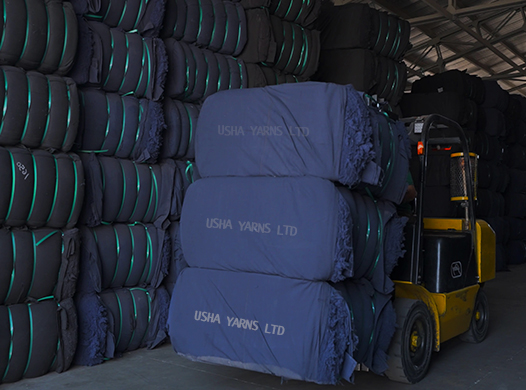
Honoured by Dun & Bradstreet for Business Enterprises of Tomorrow 2023
August 21, 2023
Shattering the Virgin Mold
January 4, 2024The Imperative of Quality in Recycled Yarns: Sustaining Sustainability
In recent years, sustainability has become a buzzword in the world of fashion and textiles.

As consumers increasingly demand eco-conscious products, brands have been eager to integrate recycled materials, such as recycled yarns, into their offerings. While this shift towards sustainability is commendable, a critical challenge looms large: ensuring consistent quality in recycled yarns. This article, delves into the need for nominating quality recycled yarns and the broader need for unwavering quality when using recycled yarns. It has also unveiled how unverifiable sustainability claims and poor quality can not only jeopardize the viability of the sustainability movement but also pose a threat to the very existence of brands.
The Rise of Recycled Yarns
The fashion industry is one of the largest contributors to environmental degradation. From water-intensive cotton cultivation to chemical-heavy dyeing processes, traditional textile production takes a toll on the planet. Recognizing this, brands are increasingly turning to recycled materials as a means to reduce their ecological footprint. Recycled yarns, often derived from post-consumer or post-industrial waste, are at the forefront of this movement. They represent a promising shift towards circularity, where waste materials are repurposed into new, valuable products.
The Challenge of Consistent Quality
While the intentions behind using recycled yarns are noble, ensuring consistent quality in these materials is a complex endeavor. Unlike virgin materials, recycled yarns can vary significantly in composition and quality. Factors such as the source of the recycled materials, the recycling process, and the skill of the manufacturer all play a role in determining the final product’s quality. Inconsistent quality can lead to numerous problems for brands.
Firstly, inconsistent quality jeopardizes the reliability of the end product. Fashion brands depend on delivering products that meet or exceed customer expectations. If the quality of the recycled yarns used fluctuates, it becomes challenging to maintain product standards. Irregularities in texture, durability, and appearance can tarnish a brand’s reputation and erode consumer trust.
Secondly, poor quality recycled yarns can lead to a waste of resources. Brands invest time and effort in designing and producing their products. Subpar recycled materials can result in increased production waste, ultimately undermining the sustainability goals they seek to achieve.
The Need for Nominating Quality Recycled Yarn
To address the challenge of inconsistent quality in recycled yarns, there is a pressing need for the nomination of quality suppliers and materials.
Brands must carefully select suppliers and manufacturers with a proven track record of producing high-quality recycled yarns. This nomination process involves rigorous assessment and verification of a supplier’s capabilities and adherence to quality standards. By nominating quality recycled yarns, brands can mitigate the risks associated with poor-quality materials and maintain the integrity of their sustainability initiatives.
Unverifiable Sustainability Claims
In the rush to embrace sustainability, some brands have been guilty of making unverifiable claims. The allure of appealing to eco-conscious consumers can tempt companies to exaggerate their environmental commitments. This phenomenon is commonly referred to as “greenwashing.” When brands make sustainability claims without credible evidence or transparency, it erodes consumer trust and casts doubt on the broader sustainability movement.
The Connection: Quality, Sustainability, and Brand Viability
The connection between quality, sustainability, and brand viability cannot be overstated. Brands that use recycled yarns must prioritize quality assurance as a fundamental component of their sustainability strategy. Quality serves as the bridge between the admirable intention to be sustainable and the tangible, long-lasting impact on both the environment and the brand’s bottom line.
Quality assurance in recycled yarns ensures that sustainability claims are not just superficial marketing ploys. It substantiates a brand’s commitment to reducing environmental impact, fostering genuine circularity, and contributing to a more sustainable future. Brands that uphold quality standards in their use of recycled materials not only bolster their reputation but also encourage broader adoption of sustainable practices in the industry.
Conclusion
In the era of sustainability, the nomination of quality recycled yarns is a critical step towards a more responsible and eco-conscious fashion industry. It complements the broader need for unwavering quality when using recycled yarns. Brands that prioritize consistent quality in their materials, supported by the careful nomination of suppliers, not only ensure the reliability and integrity of their products but also contribute meaningfully to the sustainability movement. Conversely, unverifiable sustainability claims and poor quality can lead to the demise of an idea or even the brand itself. Therefore, it is imperative that brands recognize the interconnectedness of quality, sustainability, and brand viability, striving for excellence in all three domains to forge a truly sustainable future.







